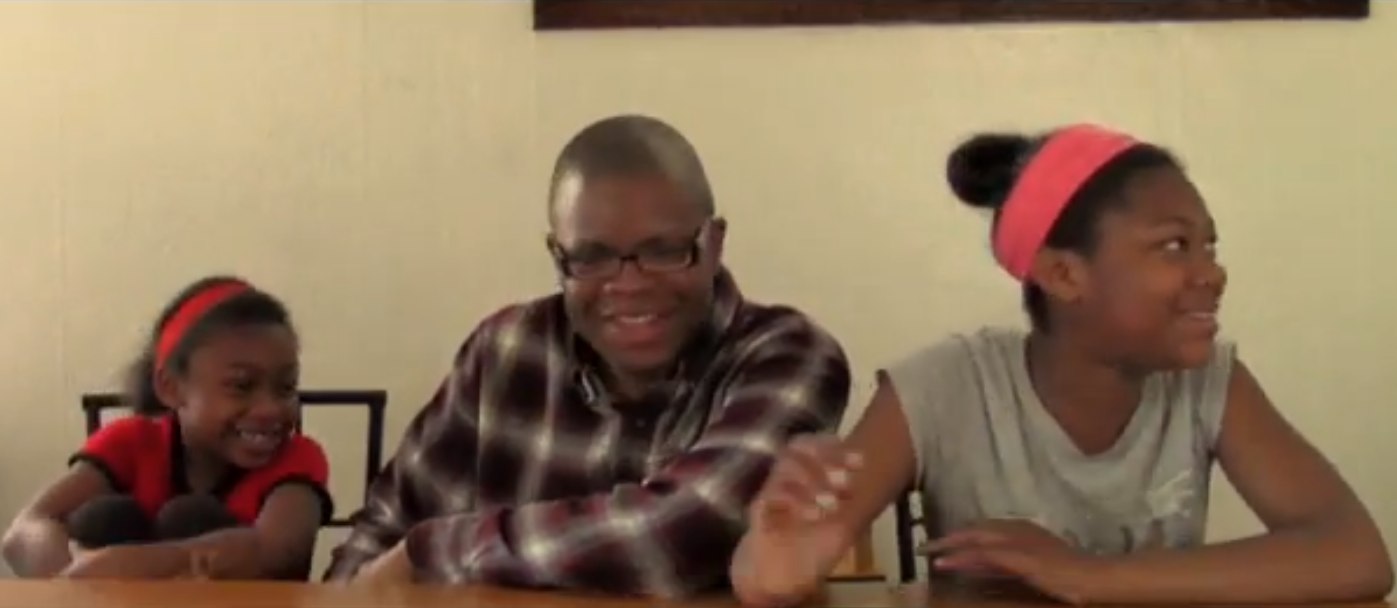Andre Oliver is a young filmmaker from Canton, Ohio who just finished his first autobiographical documentary, Stray From the Flock: The Story of a Black Atheist. It’s not a slick film, but it’s heartfelt and genuine. I think it’s going to stay with me for a long time, which is refreshing amidst so much polished but forgettable movie tripe.
Going by the old auteur’s adage to “write what you know,” Andre makes good use of his easy access to his own extended family. His uncles and cousins and nieces, and his mom, are all pretty comfortable in front of the camera, and they don’t hold back when Andre asks them probing questions about belief and non-belief. See for yourself (this is the whole 51-minute film, not just an excerpt):

Andre’s uncle Jarvis gets the most screen time. Perhaps that’s because he’s the one who occasionally veers close to insight, or at least close to asking a worthwhile question of his own. For instance (2:35):
“Every time that we think that something doesn’t exist — or we think that it’s not there, there’s no evidence — it’s simply because we haven’t found the evidence. Are you searching?”
Good question. Is he? If Jarvis acknowledges that there’s no evidence for God, on what does he base his beliefs?
He continues:
“If you’re an atheist, you’re probably not searching, so you probably don’t believe it exists anyway.”
But what does he wish his nephew to look for? You can no more blame a man for not searching for God than you can fault him for not spending his life trying to confirm the existence of Bertrand Russell‘s celestial teapot. Besides, searching for God implies a desire — and a bias — to find him. Searching for truth is something else altogether (though the two are not mutually exclusive).
The whoppers keep coming. Jarvis:
“That’s the same thing about air I guess. You can’t see it but you breathe it. It keeps you alive.”
Oy. We know oxygen exists because we’ve long ago charted the photosynthesis that produces it. We know how oxygen aids the respiration and metabolism of humans and other life forms, and we can measure its presence or absence. We can also see oxygen, under certain circumstances. Obviously, no comparable scientific proofs exist to support the belief in God.
This is both the strength and the weakness of Stray From the Flock: Every argument brought up by the interviewees can be easily contested and, in most cases, blown out of the water. Andre, though, doesn’t really debate anyone (the one time he pushes back is when Jarvis says that nothing in the Bible condones slavery, when in fact there are dozens of Bible verses that would certainly seem to do exactly that). It’s instructive to just listen to these people talk candidly about religion and atheism without them getting slammed with on-the-spot rebuttals. At the same time, their misconceptions and fallacies cry out to be countered. I suppose that ultimately, the movie is more of a sociological portrait than an exercise in cerebral gymnastics, and I can live with that.
It’s one of the film’s strong points that Andre addresses, true to the title, what it means to be a black atheist. One example: his mother says, at 18:48,
“I could never understand why a person, especially in black America, would be atheist. Because from the slavery days to all the things we’ve gone through as black America — that a black American would not believe is just unbelievable.”
That’s roughly a hundred times the size of the guilt complex that white Christian parents try to hang on their godless brood.
Andre adds (20:06) that some of his friends have accused him of “acting white,”
“Because apparently, for some fucking reason I don’t know, black people see atheism as a white thing — something that black people just don’t do.
He looks tense and dejected in that scene, but we see a gentler, happier side of him when he playfully interviews his nieces Le’asia and Samyra. Especially Le’asia, the littler one, is a real sweetheart. Though she can’t be more than six years old, she already displays an independent spirit. Going against the leading questions asked by her off-camera mom, Le’asia declares roundly that Andre shouldn’t have to go to church “if he doesn’t want to” (45:13).
But for me, the high point of the movie comes soon after Andre enters delicate territory and asks the girls if they believe in Santa Claus. Le’asia has this bright, fantastic answer (45:40):
I saw receipts on the table.
I saw receipts on the table. How cool is that? That totally deserves to be the next big Internet meme for skeptics — the perfect reply to anyone who tries to sell you a line of pretty bunkum.
Someone please put Le’asia’s observation on a T-shirt. I’ll wear it proudly.
=-=-=-=-=-=-=-=-=-=-=-=
If you’d like to own Andre Oliver’s movie, you can buy a DVD copy here. Want to make a donation to help finance his next project? Right this way.



It’s Moving Day for the Friendly ..."
It’s Moving Day for the Friendly ..."
It’s Moving Day for the Friendly ..."
It’s Moving Day for the Friendly ..."